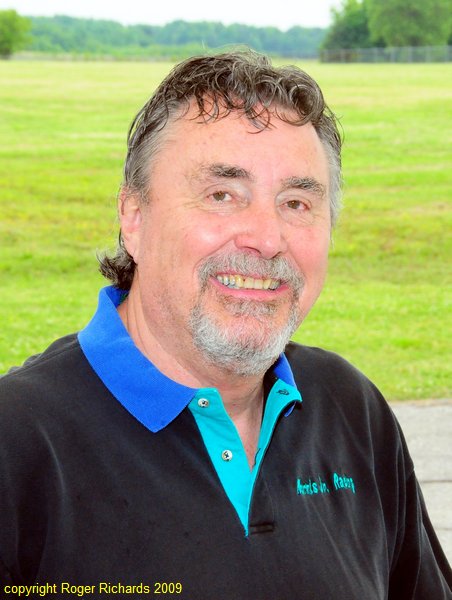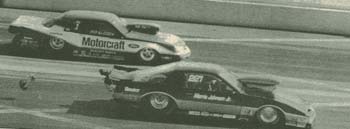VETERAN'S DAY ENCORE: MORRIS JOHNSON JR.: FROM WAR TO DRAG RACING
Originally published Memorial Day 2009
If tomorrow all the things were gone,
I’d worked for all my life.
And I had to start again, with just my children and my wife.
I’d thank my lucky stars, to be livin' here today.
Cause the flag still stands for freedom, and they can’t take that away.
And I’m proud to be an American, where at least I know I’m free.
And I won’t forget the men who died, who gave that right to me.
And I gladly stand up, next to you and defend her still today.
Cause there ain’t no doubt I love this land, God bless the USA.
 Morris Johnson Jr. can’t help it. Every time he hears those lyrics from the famous Lee Greenwood song “Proud to be an American,” his eyes well up with tears.
Morris Johnson Jr. can’t help it. Every time he hears those lyrics from the famous Lee Greenwood song “Proud to be an American,” his eyes well up with tears.
“I am the kind of guy who looks at the flag for the greatest country in the world and gets goose bumps,” Johnson admits. “I get a tingle that I don’t know that everyone gets when they see the flag or the Star Spangled Banner is sung. When Lee Greenwood sang that song it became almost as popular as the national anthem.”
Johnson, of Smith Mountain Lake, Va., remembers the day a pair of brothers approached him on behalf of their deceased brother who lost his life during the Vietnam War. The Pro Stock driver was already emotionally charged after watching the skydiver fly above him carrying the flag as the Greenwood song played over the public address system.
They wanted Johnson, then a Pro Stock driver on the NHRA Pro Stock tour, to pin their brother’s pilot wings on his firesuit and race with his memory that day and beyond, if possible.
Johnson was taken aback by the gravity of the situation.
“You want me to have his wings?” Johnson asked. The brothers nodded in agreement.
Johnson obliged, but the tears streaming down his face made it nearly impossible to race, much less stage his car. He didn’t come close to winning that day but suddenly at that moment, winning or losing didn’t matter.
“They pinned those wings on me and needless to say I was useless from that point on,” Johnson admitted. “I had tears streaming down my cheeks and that was the only time Darrell Alderman was able to beat me.”
Just being there for the brothers meant the world to Johnson. It let those brothers know someone cared and that their brother’s military service meant something that transcended far beyond drag racing wins and losses.
Johnson, one of the leading underfunded NHRA Pro Stock drivers of the era, is a disabled veteran having served in the Vietnam War. He was honorably discharged with three purple hearts and two bronze stars for his courage under fire.
Johnson raced this weekend at the ADRL Quarter-Max Memphis Drags for the first time in almost two decades, a triumphant return to the one place where the man who grew up as a poor sharecropper felt at ease following the tours of duty in the U.S. Army which would forever shape his life.
Johnson is the kind of guy everyone liked almost instantly. He was the guy who quickly gained the respect of his peers back in his day of competitive drag racing.
Johnson was inspirational to the point that he reportedly inspired the late tough-as-nails NHRA starter to shut off two Top Alcohol Dragsters on the starting line and put down his starter box to pay tribute to Johnson, the ultimate underdog, when he defeated the unbeatable Bob Glidden in the first round of the 1988 NHRA Winternationals.
The capacity crowd rose in a standing ovation.
“It never ceases to amaze me when one small group with the help of many behind then can affect so many masses of people to the point that it stops the world, makes them the center of attention and brings the onlookers to tears,” Johnson said.
Johnson’s story will bring you to tears. It is one of courage in the face of adversity, camaraderie and inevitably pain and anguish … one of a man who bravely served his country developed a prosperous livelihood and pursued a dream of professional drag racing only to lose it all due to the effects of a traumatic condition that wounds the emotional psyche of even the strongest of the strong.
Johnson’s disability, which made his whole world come crashing down, was the result of his faithful service to his country. He suffers from the effects of post-traumatic stress disorder.
His initial orders in 1968 would have sent him to Germany, but the fear of not being able to save any money prompted him to volunteer for Vietnam, plus the extra cash for combat pay.

Morris Johnson was assigned to a unit in the Central Highlands of Vietnam known as Pleiku. His extensive training at Ft. Sill enabled him to outrank a Korean War veteran, who didn’t take too kindly to the young officer schooling the troops on how to fire their howitzers more efficient than in the past.
CLICK HERE FOR THE FULL STORY
The reassignment sent Johnson to special military school in Fort Sill, Ok., where he boasts he learned how to operate every single weapon in the United States arsenal.
Johnson did an event-filled tour of duty in Vietnam, ending up outmatched by the enemy at the Ben Het firebase. His group consisted of 65 soldiers while the enemy surrounding the camp was measured by intelligence at 10,000 Viet Cong guerrillas.
He was wounded three times during his tour at Ben Het, and admittedly lost a lot of good men. His injuries were sustained during a sixty-day period, one of which came when an enemy shell landed in the middle of Self Propelled Artillery Units, causing a stockpile of one of the staged shells to detonate sending a large amount of shrapnel into his back down to his legs.
Johnson was awarded three purple hearts and two bronze stars. He declines to discuss what inspired the pair of awards which are presented for heroic acts or meritorious service.
Johnson believes, “There’s no ‘I’ in a team, and you need teams to win drag races and wars.”
He’s always tried his best to be a team player but has second-guessed his Vietnam assignment for many years.
“I’ve always wondered why such a small group was sent up there to that hill … all I know is that we did our job and got out of there alive,” Johnson said.
Surviving the hell of Ben Het was one challenge, readjusting to civilian presented another.
“I came home from Vietnam, and I became dormant,” Johnson said. “I did nothing, and the V.A. called me after I had been out for a year. They wanted me to come in, and they worked on my teeth, my ears, and everything. Next thing I know they are sending me a letter telling me that I am 30-percent disabled.”
The disability had nothing to do with his physical but rather his psychological injuries.
“I was having severe nightmares,” Johnson said. “My dad had to nail plywood over the windows of the house to keep me from kicking them out from the nightmares.”
The one injury that hurt Johnson the most, one he was never compensated for by the military, happened during one of the nightmare episodes.
“I could lay on the bed with only a sheet on me and could flex every muscle I had during one of the nightmares,” Johnson said. “I could flex so quick that I could hit the sheetrock in the wall. I just tore my spine to pieces from this and had to have back surgery to repair the damage. The V.A. wouldn’t help me with anything.
“They told me it wasn’t Vietnam or service related.”
The nightmares subsided over time, and by 1990, he’d all but pushed them out of his mind.
“I had already built a pretty good name in racing and had a successful business,” Johnson said. “I had thought that everything we did in Vietnam was what we were supposed to do. I thought it was honest and had a purpose.”
Then Johnson’s war returned.
“I got to where I would see a kid with dirty clothes playing while I drove down the street and it would tear me up to the point that I would pull over and start crying,” Johnson said.
The depression of the repressed memories set in and eventually caused Johnson total financial destruction.
“I lost everything I had and ended up spending 17 days at the V.A. Hospital in Richmond,” Johnson admitted. “I just lost it and felt awfully close to a complete mental breakdown.”
It has taken Johnson every bit of ten years to recover from the breakdown.
“I couldn’t race because I lost everything I had,” Johnson said of his time away. “I had to try and find a reason to want to live again.”
 Slowly Johnson began to put his life back together and did some tuning on several prominent Pro Stock teams. He joined his son George, a Marine veteran, and together they started a small irrigation system business that has prospered.
Slowly Johnson began to put his life back together and did some tuning on several prominent Pro Stock teams. He joined his son George, a Marine veteran, and together they started a small irrigation system business that has prospered.
Over the last few years, Johnson has taken the necessary steps to return to racing. The last decade and a half have been a struggle to get to this point.
“I went from being one of the most newsworthy racers out there to not being able to go to the race because I couldn’t get a $200 credit card with $250 cash,” Johnson revealed. “I literally lost everything after building a net worth of $5 million. I grew up poor and figured I was going to have to go back to eating potatoes and picking beans. I was afraid to see that happen and was fearful, yet helpless, to do anything about it.”
According to Science Daily, one in five veterans returning from Iraq and Afghanistan duty suffer from PTSD or depression. Reports suggest that as many as 30-percent of the Vietnam veterans suffer from what has proven to be a debilitating psychological disorder.
Johnson believes he has his condition in check and brighter days are ahead. He recently won an award from his town’s Chamber of Commerce for his efforts to bring business to the community.
“Each year they give an award for outstanding work within the community,” Johnson explained. “It just shocked me when we went to the banquet, and they started talking about this guy who had done this and that. I thought for a moment; he sounds a lot like me. I was surprised when I found out that it was me.”
Johnson walked to the podium unprepared. His words were priceless.
“The last time something like this happened was December 21, 1969 … when I came home from Vietnam,” Johnson said. “I walked around the farm roads of Huddleston, Virginia before anyone ever said, ‘Welcome home.”
“One morning a local pastor walked up to me and said, ‘My son was in Vietnam and I know he was at Cameron Bay where they didn’t have to do much of any fighting, but I know you did because I saw you on television. I want to say, thank you and welcome home.’”
On behalf of drag racing community who saw Morris Johnson Jr. rise to the top, only to fall out of existence and then return this past weekend, Thank you, Morris.
Thank you and Welcome Home.
Get the @competitionplus Mobile APP to get your drag racing news quick and easy. - https://t.co/HsiKEmdZXO pic.twitter.com/qpgtrHqnpr
— Competition Plus (@competitionplus) January 4, 2019





































